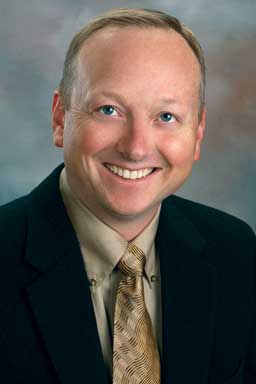If you didn’t feel the passion and purpose emanating from our 41st AASV Annual Meeting, then you also didn’t record a pulse at the free heart-health screening! I spent the morning after the meeting searching the parking lots of Qwest for all the balls that were hit out by our speakers – forget the College World Series – we were the big show in Omaha this year! But if our knowledge and enthusiasm isn’t put to work, then we will have failed our clients and ourselves. As Dr Lowe aptly stated in his Howard Dunne lecture, “Ignoring something broken is condoning it.” Our true success will be measured by how effectively we live out our story of stewardship to the pig and further communicate that to the public.
The theme of “Implementing knowledge” seemed to resonate with attendees – we are truly in a unique position as swine veterinarians to lead change of thought and deed on pig farms, but also to influence how communities understand agriculture. For the first time ever, we devoted an entire day’s session to pig well-being, and throughout sessions and seminars, the program committee worked diligently to connect science with real case studies, creating opportunities for discussion and debate. The goal isn’t to just get smarter, it is to ask the right questions and then implement solutions. The opportunities are all around us to make a difference!
In presenting the Alex Hogg lecture, Dr Davies pointed out very clearly that “Misinformation is worse than no information.” Demonstrating to normal and reasonable people that our practices on farms agree with their values will strengthen our standing in the community of public opinion. We need to start listening better if we are to find paths to the future. Our brother-in-arms from the timber industry, Bruce Vincent, appropriately challenged us to a game of “Reverse jeopardy”… meaning that we’ve got to start answering the questions that aren’t being asked. The truth has no value without a champion…correct the lies…address the enemy – ignorance. “You don’t have to be the wave, but be the ripple!” People want to hear a message of hope for their planet. They are ready to hear from us, and we can’t hire this done. This is our charge.
My kids play sports. And, as for many of you, it gets pretty busy sometimes. Week-night practices, homework in the car, and weekend tournaments become our family time – altogether a little bit crazy. But it sure gives us something to talk about, and I get to know my son and daughter better. All while they are figuring out that you can’t do it on your own, that life (and referees) aren’t fair, and that hard work and persistence really do pay off. And every now and then I learn something unexpected.
My 8th grade son, Jay, plays basketball on a pretty good team. The last weekend of February, they played in a metro tournament against a group of large schools and managed to win out. Two of the teams they faced were quite vocal ahead of the games, grousing about having to play a bunch of “farm kids,” comments overheard by my son and his buddies. (We actually do have one son of a pig-farm client on the team and two pig-vet kids!) Those teams had very little to say after the games were over. So now my son has asked the coach if his team can wear plaid flannel shirts for their warm-ups in the state tournament next week, and come out on the court chewing on a stem of hay! You know that farm-kid thing may be working in the boys’ favor – and instead of getting mad, they’ve chosen to enjoy the moment and rise to the spirit of competition.
Using perception to their advantage, those boys understand that the endgame is what matters. Maybe we can take this lesson to the public media. Rather than fight the image of pig farming and veterinary care created by others – add substance and use it to our advantage. We can tell our stories with pictures and real people, shining the light on proper animal husbandry, demonstrating conservation of resources, and teaching models of safe food production that are environmentally sound.
My first couple of years in practice, I was like a beginner in basketball. I’d lose the ball out-of-bounds, but then steal it away at the other end of the court. I needed to get to know my teammates and their styles of play, and find out about my own natural strengths and also my major gaps. I had to learn to trust my coaches in order to bring my game to a higher level. My son had to learn the basics: aggressive defense, shooting form, and ball movement. My partners at work held up three basic principles which are absolute: make it work for the pig, make it work for the people, and make it work for profitability. It can be a challenge to accomplish all three, requiring teamwork, commitment, and communication. But it sends a clear message that we will succeed by doing it the right way.
Thanks to every one of you who keeps the pig Number One, continuing to honor the noble traditions of the swine veterinary profession. You’ve earned your flannel!
--Paul Ruen, DVM

